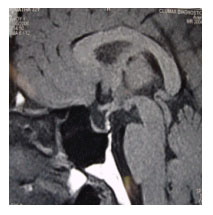What is hypopituitarism?
Hypopituitarism otherwise called as pituitary insufficiency refers to the low levels of circulating pituitary hormones. The clinical features of hypopituitarism are those of pituitary hormonal deficiencies.
What causes hypopituitarism?
- Pituitary tumors
- Radiotherapy (pituitary, brain, nasopharyngeal)
- Inflammation of the Pituitary called Hypophysitis
- Invasion of the pituitary gland (Sarcoidosis, haemochromatosis)
- Empty sella syndrome (Pituitary atrophied due to lack of blood supply)
What are the necessary investigations?
- Basal hormone levels
- Both basal concentrations of the pituitary hormones and the, target hormone levels are to be measured, as the pituitary hormones may remain within the target range despite low target hormone levels.
- LH, FSH, Oestradiol, Testosterone
- TSH and free T4
- Morning cortisol
- Prolactin
- Both basal concentrations of the pituitary hormones and the, target hormone levels are to be measured, as the pituitary hormones may remain within the target range despite low target hormone levels.
- Dynamic testing
- Insulin tolerance test
- Short synacthen test
- hCG stimulation test
- Clonodine test
- Imaging
- Pituitary imaging – MRI

What is the treatment?
- Adequate and appropriate replacement of the deficient pituitary hormones – At present we can replace all the hormones and quality of life can be put back to normal
- Treatment of the cause
- Hypopituitarism is usually permanent and requires life-long replacement treatment & monitoring